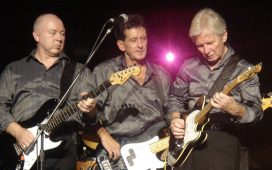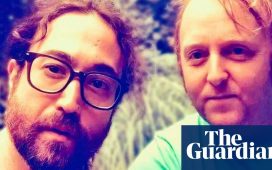An hour before we find ourselves talking, perhaps a touch too enthusiastically, about death, Will Young arrives at this London restaurant late, but only slightly, reeking of cigarettes (“Must quit soon”), and grinning winningly. His baseball cap is skewed to one side, making him look like an impish cartoon character. He says he is hungry, and orders, with clear reluctance, a plate of dairy-free porridge. (It is 11am.)
Young has been admirably candid about his mental health issues these past few years, and if he is much improved now (and we will come back to this), that is only because he works hard on the business of self-maintenance.
‘At 40, my new thing is: oh, fuck off. It’s my new saying if I don’t want to do something. I love it’
“Everything I set up around myself now has to be good for me, healthy and nutritious – from the people I work with to the food I consume.”
The porridge, when it comes, looks thick enough to grout bathroom tiles with. Young’s face falls. “Oh well, never mind,” he says, and gingerly picks up his spoon.

Now 17 years into his career, Will Young is about to release what might be the best album of his career. Called Lexicon, it does what all previous Will Young albums have done – limpid melancholy – but this time with a palpable sense of someone at last finding his stride, on his own terms.
“I do like singing sad songs,” he admits, “even when I don’t feel particularly sad myself. It’s my comfort zone, I suppose.”
A few years ago, he had considered himself washed up. He was moving away from music, doing a West End show (Strictly Ballroom) that he didn’t much enjoy, but still wanted to tour.
In order to do so, he knew he needed new material. So he entered the studio with people he had worked with before, and liked – the producer Richard X, the songwriter Eg White – and the songs kept coming. “It was all surprisingly easy, I suppose because I felt I had nothing whatsoever to prove.”
Turning 40, too, freed him. Previously, he had always felt beholden to people. Not any more. “At 40, my new thing is: oh, fuck off. It’s my new saying, I love it. If I don’t want to do something: ‘Oh fuck off!’ It’s brilliant. I know that I’m in a privileged position – I don’t have any kids, no one to support. It means I can do things my way. It works.”

Back in 2002, Young was a contestant on Pop Idol, a forerunner to The X Factor. It was produced by, and featured as a judge, an early incarnation of Simon Cowell, some years before the teeth-whitening, when the nation hadn’t yet tired of TV singing contests. Pop Idol was gripping stuff. Half the country tuned in.
Young won, as he knew he would. “When I was at university, I told a friend – now a very successful actor – that one day I would win a TV talent show. Weird, eh?”
It made him wildly famous, but this intelligent former politics student from a nice, middle-class family was never going to fit the cookie-cutter mould required of TV talent shows winners.
‘I felt I had achieved everything I possibly could have imagined, but it hadn’t made me happy’
Young soon broke free of Cowell’s clutches. The hits continued for a while, but he found himself increasingly wanting to branch out: first into acting, and later becoming an eloquent voice within the LGBT community.
“I felt I had achieved everything I possibly could have imagined,” he says, “but it hadn’t made me happy.”
So what did he do? He laughs out loud. “I had a breakdown, of course! In many ways, I’d thoroughly recommend one – you do learn a lot about yourself – but it was awful: lots of complicated neurology, so many emotions to work through. I had to go into treatment three times.”
During this time, he was still working, releasing albums, even appearing as a contestant for three weeks on Strictly Come Dancing – before abruptly
walking away. “I shouldn’t have [done the show],” he says.
He had been diagnosed with anxiety and a PTSD triggered, it was thought, by having been briefly separated from his twin at birth, and later bullying at school. His breakdown was total.
“I went into shutdown mode. I got depersonalisation, complete disassociation. You don’t recognise yourself in the mirror; you can’t contextualise anything. It lasted three years, a horrible, horrible time.”
Read more: Entertainment vs ethics: how psychologists protect reality TV contestants’ mental health
He believes he managed to claw himself back to something resembling recovery only by dint of personal circumstance. “I had enough funds to pay privately to find the best therapy that worked for me. I also found I had a strong constitution and, ultimately, a strong desire to live.”

These days, he gives talks on mental health, and comes across as almost disarmingly at ease with himself, a man whose happiness is well earnt, even enviable. He is recording music once more, hosts a popular podcast (Homo Sapiens), and is writing his first book, How to Be a Gay Man, to be published next spring. Life sounds pretty good.
When I tell him this, his shoulders visibly slump. He is silent for a full minute. “That triggers something in me, when you say that. I have to check in with myself, because I’m constantly modifying.”
‘I have to acknowledge the many different parts of me – the part that is an absolute c**t, and egotistical, but also those parts that are beyond kind and sensitive, too’
There is a part of him, he says, that cannot let go of his previous dysfunctional self, that cannot admit to contentedness. “I have to notice that, and let it settle, and then acknowledge the many different parts of me – the part that is an absolute c**t, and egotistical, but also those parts that are beyond kind and sensitive, too.”
Slowly, his frown eases. “In many ways, I don’t think I could be in a better place than I am right now – with family, work, romance, spirituality – but I still have to work really hard to get through a day. It’s never easy.”
Read more: Will Young – ‘I’ve had to run away from knife threats, hide in shops’
We change the subject, and talk instead about another book he wants to write, called “Fear”, in which he will discuss our collective obsession with, and fear of, death. He appears much more comfortable on this topic, and suddenly he is smiling, giggling.
We discuss death until a waitress comes to take away his porridge, at which point we realise the time, and the fact that outside on the street, look, the sun is shining.
‘Lexicon’ is out on 21 June














